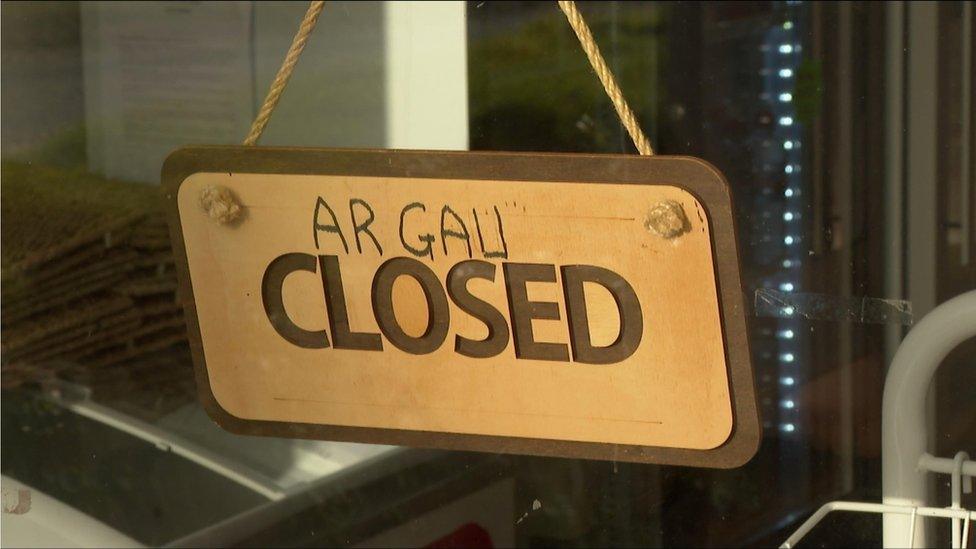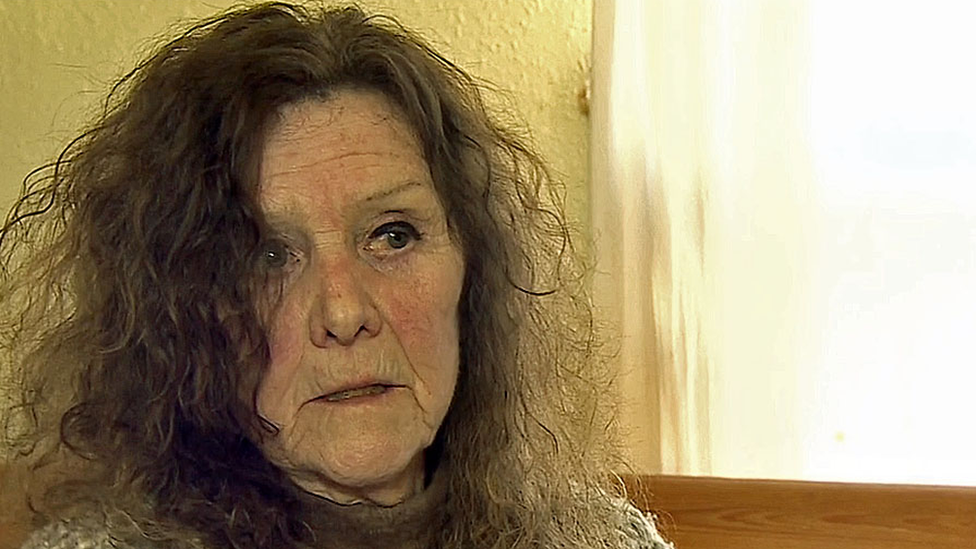Cost of living: Businesses forced to close over energy costs
- Published

Farm shop owner Sion Edwards: "If things continue as they are, there won't be any small businesses"
A farm shop owner has shut the business for two months, blaming £100-a-day electricity bills to keep his fridge and freezers working.
Sion Edwards planned for Abersoch Farm Shop, Gwynedd, to be open all year round when he set it up 18 months ago.
A lack of certainty over long-term cash support has led to more Welsh companies shutting, downsizing or changing their plans, according to business leaders.
The UK government said its £18bn Energy Bill Relief Scheme expires in March.
It also confirmed on Monday that under the new scheme, which will run from April, firms will get a discount on wholesale prices rather than their costs being capped as under the current one.
"If we keep going like we are now, we won't be here in spring," said Mr Edwards.
The business, which sells local products and includes a café, was intended to help the family farm survive in the long term, but, at the moment, it has been doing the opposite.
He has been trying to keep running costs down, including cutting staff hours, switching off boilers and running one less coffee machine in the café.
Mr Edwards said he recognised that seasonal visitors drove the business but, last year, he was able to stay open through the winter, employing up to five members of staff.
But he said the winter income had not been "touching the sides" in terms of covering energy costs and wages.
"The saddest thing about it is that this is the centre of the community," he said.
"There aren't many other places nearby that are open all winter."
Mr Edwards said he was "terribly worried" about the future.
"If things continue as they are, there won't be any small businesses," he said.


Closed: Newtown family butcher William Jones and Sons opened in 1876 but closed on New Year's Eve 2022
Butcher shop to close after 146 years of trading
Family butcher William Jones and Sons shut up shop in Newtown, Powys, after almost 150 years when owner Mark Jones discovered his bill was set to rise from £1,000-a-month to £1,000-a-week.
The business was founded by his great, great, great grandfather in 1876, and the shop had been based in its High Street location since 1945.
But Mr Jones, 65, who was in partnership with his mother, Ruth, said: "We just decided enough was enough.
"Refrigeration is our main cost, and being a butcher it's not like we can do without it.
"Lighting costs are minimal, but keeping my products cold was going to cost a small fortune."
Mr Jones said he had been "touched by the response" of customer during the final few days of trading.
"I received cards and even bottles of wine in thanks before we closed," he added.


Other Welsh firms are closing, downsizing or changing plans due to costs, said Dr Llyr ap Gareth
Dr Llyr ap Gareth, head of policy for the Federation of Small Businesses in Wales, said he wanted to see long-term support for businesses with the UK government's Energy Bill Relief Scheme due to come to an end in March.
"We're hearing from a lot of our businesses that due to the cost crisis in general they're looking to downsize, to change their model of business radically or indeed to close, with a quarter of businesses looking to do that," he said.
"When it comes to certain sectors like food and hospitality, it goes to over 40% of those businesses looking to downsize or close their businesses."
He said "challenges to small businesses are from every area... but the clear, most decisive factor at the moment is the increase in energy prices".
"The fact that they're still waiting to see what will be happening with energy support from April onwards, alongside all the wider uncertainty, makes it very difficult to plan," he added.
What does the Welsh government say?
The Welsh government said it recognised it was an extremely challenging time for businesses.
It said last month it announced £460m in rates support for the next two financial years.
But it added that "only the UK government has the fiscal powers necessary to provide the immediate protection needed in the face of this crisis".

NEW WRITING IN WALES: Huw Stephens celebrates fresh new writers in Wales
ACID DREAM: The Great LSD Plot

- Published4 January 2023

- Published9 December 2022

- Published20 October 2022

